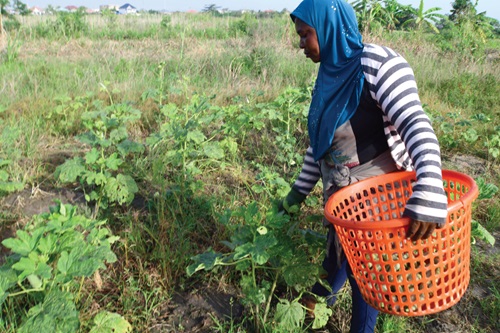
Despair, salinity, erratic rainfall, poor yields: 300 Weija irrigation farmers battle climate change
Asmao Nartey Soji is not a happy person.
The gains from the good harvest she made from vegetable farming some years ago are virtually eroding.
Advertisement
A combination of factors such as increasing salinity of the soil, unpredictable rainfall pattern, and pest invasion, have left her counting her losses.
The 37-year-old mother of one has been farming on the two-and-a-half acres of land bequeathed to her at the Weija Irrigation Scheme site at Tuba in the Greater Accra Region.
The Weija Irrigation Scheme covers a total area of 225 hectares, out of which the irrigable land is 180.2 hectares.
Currently, there are 300 farmers at the site, made up of 233 males and 67 females.
These farmers, their households and the over 4.5 million residents of the Greater Accra Region depend on the irrigation scheme for vegetables such as tomatoes, cucumber, onions, pepper, carrots and okro.
However, the debilitating effects of the climate crisis, increasing salinity of the irrigable land, invasive pests and erratic supply of water to the fields, have combined to rob the farmers of the fruits of their labour.
While the farmers defy the increasing cost of production and break their backs to produce crops under these unfavourable conditions, post-harvest losses and poor markets for their produce continue to hit them hard.
On a visit to the irrigation site on Friday, November 17, Asmao was seen harvesting okro.
The okro plants looked pale, yellowish and malnourished, with sparing fruits, and visible signs of pest and insect infestation.
“When the land was not salty, I used to get good yields.
But because of the salinity of the land, okro, onion and other plants fail to provide good yields; and I am losing a lot.
This year, I lost all the onions I planted.
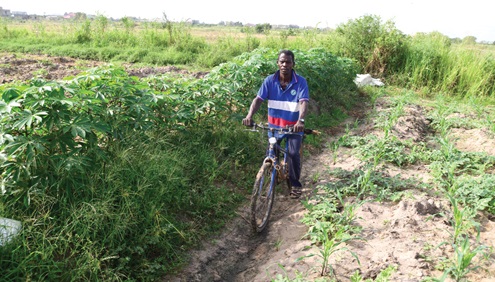
54-year-old Ogbamey Tackie riding a bicycle to his farm at Tuba
Some of the plants got stunted while others wilted,” she narrated.
The dwindling fortunes of Asmao’s vegetable farm have affected her disposable income as she continues to struggle to make ends meet.
“My profit margins are virtually non-existent; I put in a lot of money but get little in return,” she said.
She explained that as a female farmer, her situation was even worse because she had to pay farm labourers to carry out almost all activities, ranging from land preparation, weed control and watering to spraying of the insecticides.
Wider picture
Just like Asmao, the 300 farmers at the Weija Irrigation Scheme are at the receiving end of the vagaries of the global climate crisis.
While over 20 acres out of the 500-acre irrigation land has been lost to salinity, unpredictable rainfall patterns and associated flooding of the area cause the farmers to lose the produce.
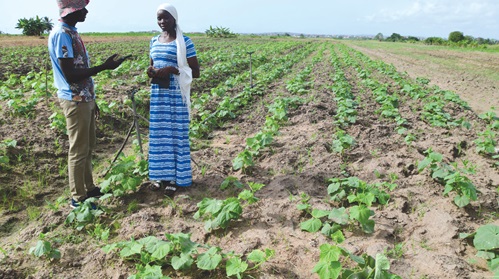
Asmao Nartey Soji being interviewed by Timothy Ngnenbe, a reporter of the Daily Graphic, at Tuba
One such farmer is 54-year-old Ogbamey Tackie, a father of eight, who said although the farmers were privileged to have the irrigation scheme to support their activities, their plants were still suffocating because of the negative impact of climate change.
“In the past, we could predict when the rains would set in and plan our activities accordingly, but now, the rains will come when you do not expect them and fail to fall when you need them most.
If you bank your hope on the rainfall pattern, you will be in trouble,” he said.
To add insult to injury, Mr Tackie said the irrigation scheme was not functioning as it did some years ago.
“Sometimes, we are not able to water the plants at the right time because the machines that pump water get faulty.
Other times, the managers shut it down because of the high cost of power,” he said.
He added that although the farmers had been put into four groups, just two groups could have access to the machines in a day.
Another farmer, Abdul Karim Tetteh, a father of four, lamented the invasion of Fall Armyworms (FAM) on his maize farm.
The 49-year-old owns two-and-a-half acres of land on which he cultivated maize, cucumber and cabbage.
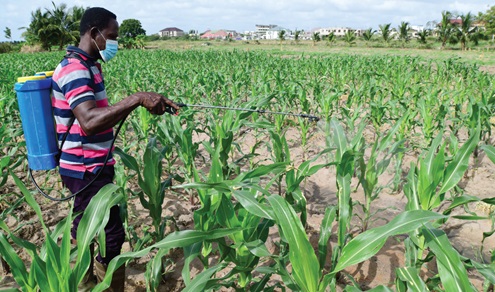
Abdul Karim Tetteh spraying his farm at Tuba
However, it was observed that FAM were lodge between the nodes of the maize and devoured the young plants.
“Armyworms remain a huge challenge for us, especially maize farmers; so, many people have switched from maize production to other things.
We spend so much money on insecticides but the pests keep coming,” he said.
Access to finance
The farmers complained that access to finance remained one of their greatest challenges because financial institutions were unwilling to offer them loans because of the risk of non-payment.
“We are unable to take higher amounts of money from banks because anytime the bankers come to check our farms, they say they cannot give us higher amounts because we may not repay,” Mr Tackie said.
Meanwhile, some potential customers have taken advantage of the situation to give farmers a pittance upfront to plant crops with strings for the harvest season.
“Customers give loans to farmers and end up cheating them when the crops are harvested,” he added.
The difficulty the farmers at the Weija Irrigation Scheme face in accessing funds to scale up production, feeds into the plight of smallholder farmers in developing countries.
Just 0.3 per cent of international climate finance goes to smallholder farmers, although they produce a third of the world’s food, research has established.
The research published by an alliance, representing 35 million family farmers in Africa, Asia, Latin America and the Pacific, also found that just a fifth of international public climate finance for food and agriculture supported sustainable practices.
It stated that although smallholder farmers held the key to climate-proofing food system, they were being sidelined by funders and shut out of decision-making on food and climate.
The research titled: “Untapped Potential: an analysis of international public climate finance flows to sustainable agriculture and family farmers”, was conducted by Climate Focus and published on November 14.
Way forward
The Manager of the Weija Irrigation Scheme, Alice Wakah, admitted that the high cost of power was negatively affecting the farmers and needed to be addressed.
“I have just received the bill for October, this year, and it is GH₵40,000 and this adds to the cost of production of the framers,” she said.
Touching on the way forward, she called on the government and private sector organisations to support the irrigation scheme by installing a solar plant to minimise the cost of power.
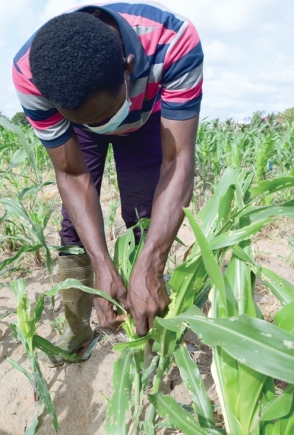 Abdul Karim Tetteh showing crops destroyed by insects
Abdul Karim Tetteh showing crops destroyed by insects
Again, she underscored the need for a processing plant to be established at the scheme to address the challenges related to post-harvest losses.
She said the processing facility was necessary because it would prevent the situation where farmers were compelled to sell perishable crops at lower prices.
“Last year, for instance, farmers sold one full box of 120-kilogramme tomatoes at GH₡700, which was so bad; but if they do not sell, it will rot on the farm,” she said.
The Dean of the University of Ghana School of Agriculture, Dr Irene S. Egyir, said farmers needed more knowledge on best agronomic practices to remain in business amid the climate crisis.
“Pests and diseases are part of the ecosystem.
They will not leave because you are there to farm, and that is why farmers must learn to manage the diversities of the ecosystem,” she said.
The Agricultural Economist said the erratic rainfall pattern farmers were grappling with because of the climate crisis was a call for investment in data for better prediction of rainfall.
She added that the climate change challenge that farmers were faced with called for the diversification of livelihoods.
Dr Egyir also called on farmers to form cooperatives and work with the private sector to start the processing factory.
“The cooperatives that are committed to looking for support, building the capacity of members, monitoring and evaluating things and learning best practices will be empowered, and then the banks will rush on them,” she said.




